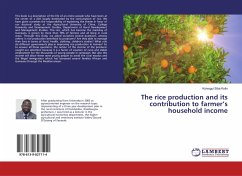
Changes in the Production Practices of Ari People, Southwest Ethiopia
mounting and diminishing crops, changing livelihoods, farmers hovering between fear and hope
Versandkostenfrei!
Versandfertig in 6-10 Tagen
39,99 €
inkl. MwSt.

PAYBACK Punkte
20 °P sammeln!
The Ari sedentary agriculturalists of tropical Africa are found in the present day Ethiopia in the Omo valley in and surrounding Jinka town. For so long their livelihood has been reliant on subsistence agriculture. In recent years, however, their production practices have shown significant changes in the kinds of crops cultivated and actual motivation behind production across the three altitudes of lowland, midland and highland all enclosed in a single district of Debub Ari. In his book, the author attempted to reveal the reasons behind the changes in their production practices from the former...
The Ari sedentary agriculturalists of tropical Africa are found in the present day Ethiopia in the Omo valley in and surrounding Jinka town. For so long their livelihood has been reliant on subsistence agriculture. In recent years, however, their production practices have shown significant changes in the kinds of crops cultivated and actual motivation behind production across the three altitudes of lowland, midland and highland all enclosed in a single district of Debub Ari. In his book, the author attempted to reveal the reasons behind the changes in their production practices from the formerly cereal dominated to a mixture of both cereal and cash crops. In so doing, the book explored the cultural, genetic and agronomic aspects of crops in exodus as they migrate from one agro ecology to the other across the three altitudes. And hence, the migration of crops from their former habitats in the lowlands to midland and then highland places is expressed by the author as mounting whilethe decline or extinction of various crops is explained as diminishing .












